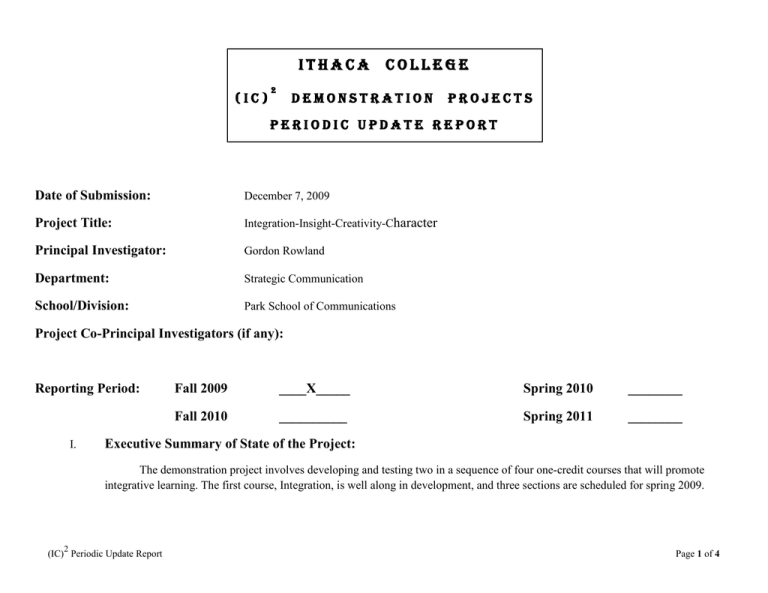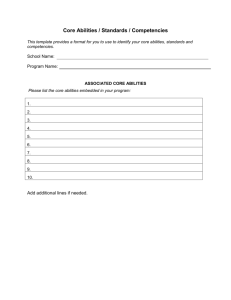Download (IC)2 Periodic Report F09 - Rowland
advertisement

Ithaca (IC) 2 College Demonstration Projects Periodic Update Report Date of Submission: December 7, 2009 Project Title: Integration-Insight-Creativity-Character Principal Investigator: Gordon Rowland Department: Strategic Communication School/Division: Park School of Communications Project Co-Principal Investigators (if any): Reporting Period: I. Fall 2009 ____X_____ Spring 2010 ________ Fall 2010 __________ Spring 2011 ________ Executive Summary of State of the Project: The demonstration project involves developing and testing two in a sequence of four one-credit courses that will promote integrative learning. The first course, Integration, is well along in development, and three sections are scheduled for spring 2009. 2 (IC) Periodic Update Report Page 1 of 4 II. Key Accomplishments to Date (or Since Last Report): * Articulation of sets of competencies for the four courses. * Progress on selecting and designing assessment instruments matched to the competencies. * Selection, design, and development of a wide range of learning activities for the Integration course. III. Key Challenges to Date: * Withdrawel of key players (Derek Cabrera and Laura Colosi from ThinkWorks) from the project. * Recruiting students to the Integration course; it became available on Homer just prior to advance registration and getting the word out and building interest was difficult. IV. How were these Challenge(s) addressed: * Gordon Rowland and Jason Hamilton stepped up to articulate the competencies, develop assessment instruments and design the Integration course. * Communications student Meghan Morales assisted with developing marketing plans, and the plans will be implemented at the outset of the spring 2010 term. V. Expenditures to Date: * None. Development work in fall 2009 will be incorporated into reassigned time and overload for spring 2010. 2 (IC) Periodic Update Report Page 2 of 4 VI. Project Assessment: Project Goal Actions Measure(s) Develop Integration course Articulate competencies; develop assessment instruments and learning activities Course design completed and documented; Pre/post measures of learning outcomes Competencies articulated; assessment instruments under development; range of learning activities partially developed Continue development Develop Insight course Articulate competencies; develop assessment instruments and learning activities Course design completed and documented; Pre/post measures of learning outcomes Competencies articulated; assessment instruments under development; ideas for learning activities generated Continue development Develop team-teaching approach Determine schedule for team-teaching; develop team-teaching processes Success of transfer from one instructor to another Schedule determined Develop team-teaching processes Document as a case of design inquiry Keep log of activities and Published case careful records of issues, decisions, and so on Log kept current; careful records kept Continue keeping log and records 2 (IC) Periodic Update Report Outcome(s) Next Steps Page 3 of 4 VII. Student Learning Assessment: The following competencies have been articulated for the Integration course. Learning activities and assessment instruments are under development. Integration * actively synthesize knowledge from multiple sources * appreciate complexity, multi-causality, and dynamics of situations * recognize interdependencies * recognize driving forces that influence our lives * understand systems and design concepts, methods and tools (e.g., holism, system, boundary, environment, system types, hierarchy, interdependence, perspective, complexity, systems models, open/closed, feedback, conceptualization, innovation, divergence, transformation, convergence); use systems and design terms appropriately * appreciate artificiality of systems and models (not just synthesis of XYZ but understanding that X, Y, Z, and XYZ are constructions) * place one’s self in context of whole systems * understand the nature of academic disciplines and fields (definition, constructed nature, objects of concern, assumptions, methods, criteria, accomplishments, limitations, etc.); differentiate and appreciate multi-, inter-, and trans-disciplinarity * enhance one’s ability to cope with uncertainty * distinguish solving problems in existing systems from designing new systems; appreciate benefits and limitations of both * apply principled approaches to resolving complex real-world challenges; integrate for a purpose * recognize how worldviews underly disciplines, systems, and one’s thinking and acting 2 (IC) Periodic Update Report Page 4 of 4



